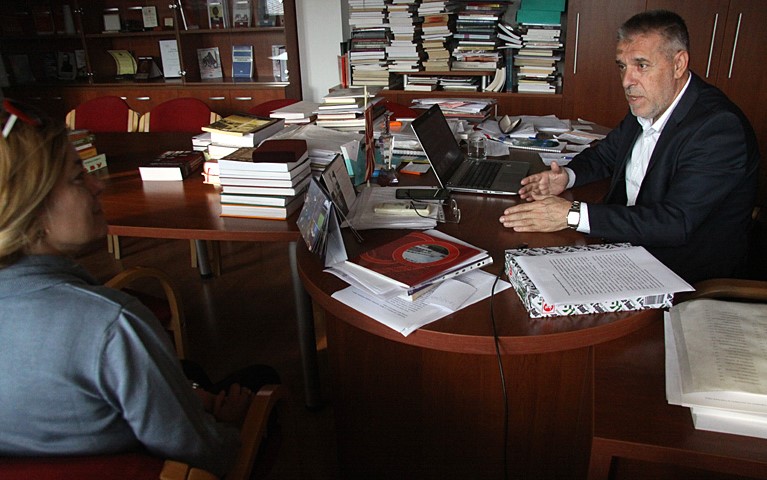Historian Dragan Georgiev, who sits in the joint expert Commission with Bulgaria which is going over historic figures and events, said that the Macedonian side has acknowledged that Goce Delcev, the legendary hero of the Macedonian national struggle, has also identified as Bulgarian and will be celebrated as a shared historic figure. This is the latest decision to come from the Commission, and Georgiev was speaking after his Bulgarian counterpart Angel Dimitrov made a different statement, saying that Goce Delcev was Bulgarian, but Bulgaria agrees that Macedonia can also honor him.
Just as Dimitrov says that Goce Delcev was Bulgarian, I can also say that he was Macedonian. His statement is an attempt to score points in the Bulgarian public, and insist that we agree that Delcev was Bulgarian and that the Ilinden Uprising was a Bulgarian uprising. We are not backing down from our positions and Macedonians must know this. Delcev is a shared historic figure of both the Macedonian and Bulgarian history. There are documents in which Delcev declares himself as Bulgarian and also documents where he declares himself as Macedonian, and we go back to how we define these two terms. If we begin proving whether Delcev was Bulgarian or Macedonian in our Commission we will get nowhere, said Georgiev.
The Commission was set up under the treaty Macedonia signed with Bulgaria precisely in order to determine the historic background of persons and events, and to prepare new history books for both countries. Given that Bulgaria holds veto power over Macedonia in the European Union accession process, it is expected that it will have a stronger hand in the negotiations and will be able to get more of its positions across, in line with its stand that Macedonians are in fact Bulgarians and speak a dialect of the Bulgarian language. Macedonian members, it was reported, made no requests in the work of the Commission so far. Georgiev said that one issue raised by the Macedonian members of the Commission is that Bulgarian history books treat Macedonia as an “unliberated part of the Bulgarian land”, beginning with the medieval period up to the modern age.
Historians from both sides argue over the millennia old Samuil Kingdom and apostles Ss. Cyril and Methodius, who spread Christianity and literacy across most of the Slavic world. Georgiev said that the Macedonian side has acknowledged that Tsar Samuil “inherits the Bulgarian royal tradition” but that the Macedonian side will push for a broader understanding of the term nation, which was not in use in the medieval period.
Samuil’s kingdom was a medieval state which included many ethnic groups and cultures and the term Bulgarians was at the time more a political than ethnic term, and much like the term Romei it meant an inclusive belonging that goes above the ethnic one. Our main goal is to try not to nationalize the medieval period and to reflect a 21 century understanding of nationality to the 11th century. It’s unscientific to project thisd view of nations thousands years into the past, Georgiev said.
Samuil ruled from Ohrid, where Cyril and Methodius set up a major university, and the city is now in the Republic of Macedonia, but is an important seat of power and learning for Bulgarians as well and Samuil styled himself Bulgarian king. Georgiev says that it is not serious to inquire about his national background, understood in modern day context, adding that, after all, he may have been actually Armenian.
We can’t resolve these issues politically. The public in Macedonia feels a sense of triumphalism coming from Bulgaria, an attempt to prove that Macedonians were Bulgarians until 1944. If the goal is to present only one side as a winner then the Commission will not meet its goals, said Georgiev.






Comments are closed for this post.